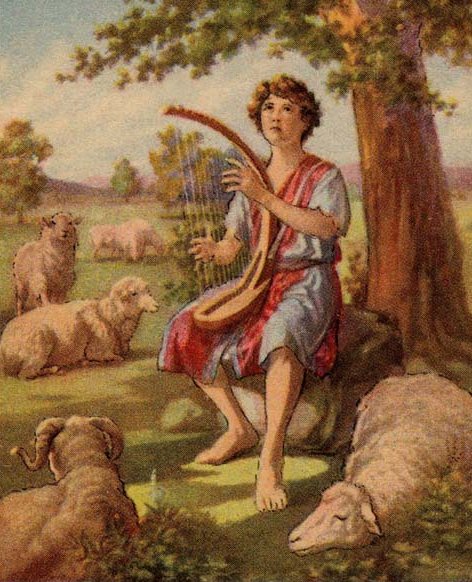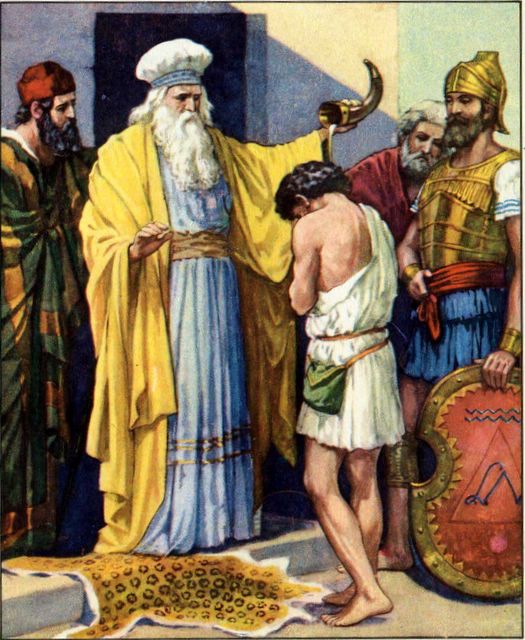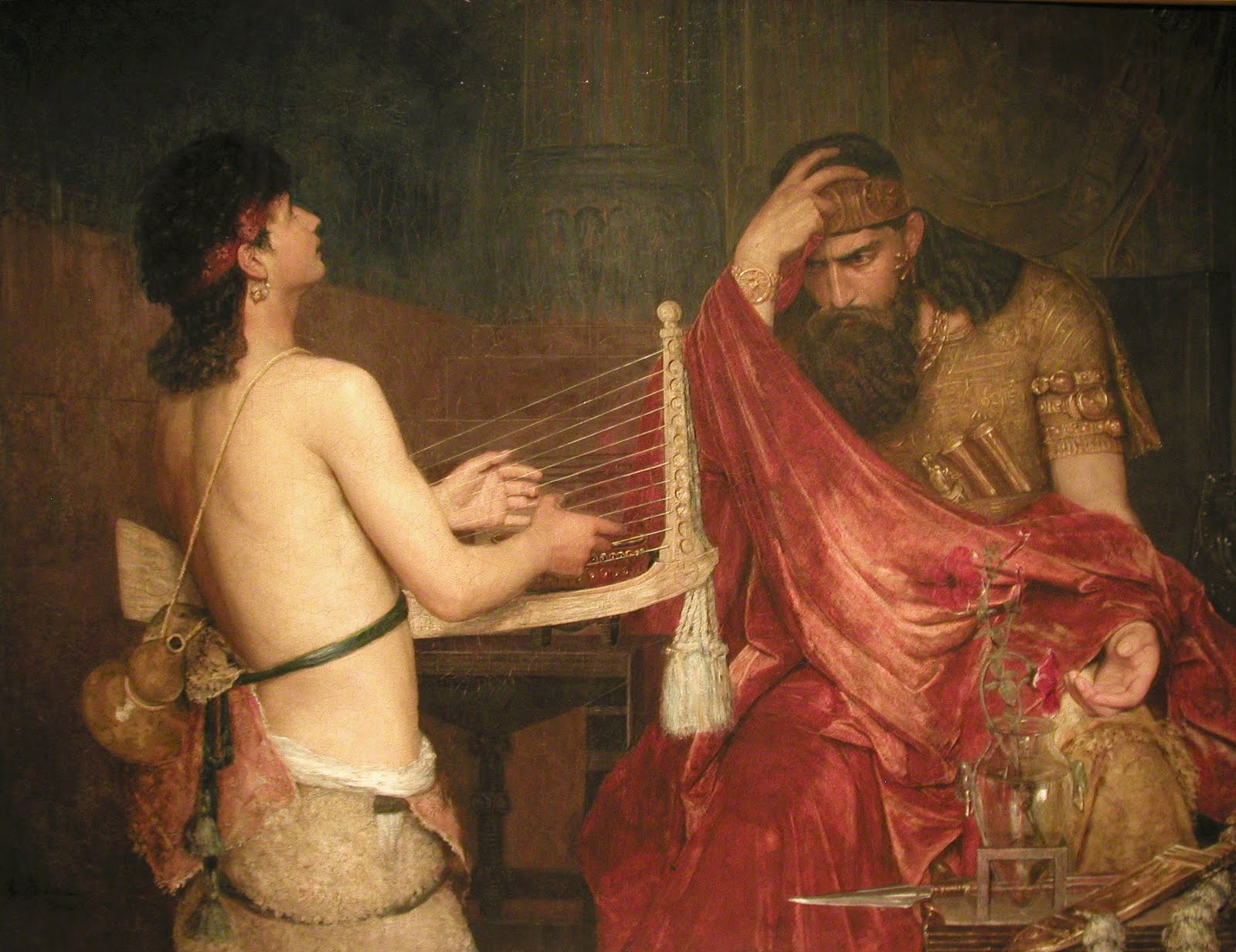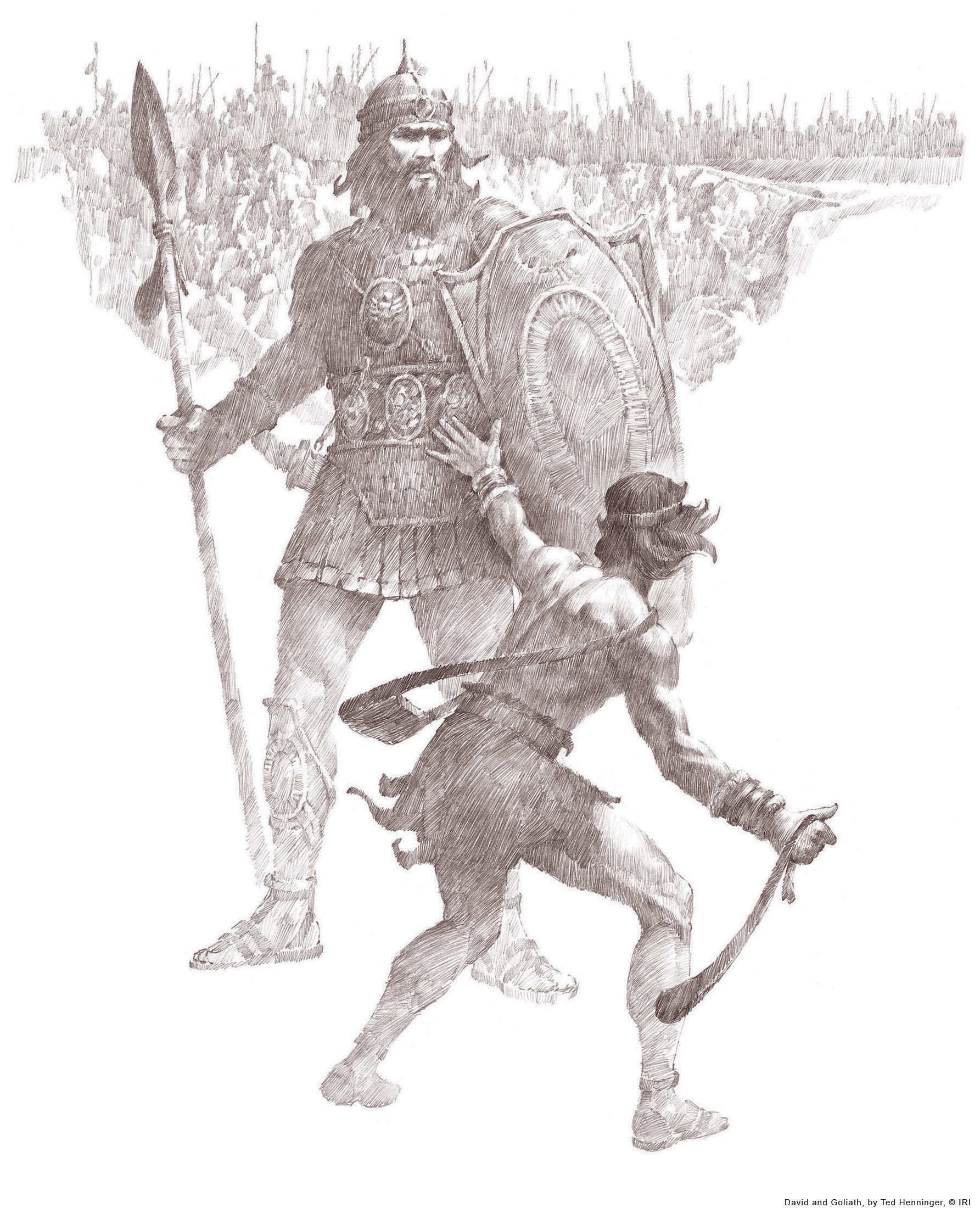Understanding King David
Like all of us, David was first a spirit son of God the Eternal Father in Heaven before he ever came to earth. In fact be may presume that he was one of the valiant and favored sons as he was to hold a high and honored position in God's eternal plan. And also like all of us, David would come to be born of this temporal existance to work out his salvation and exercise he own agency.
David's Position in God's Eternal Plan
God's plan and workings were set out before the foundation of the earth. Many religious leaders and particularly Biblical scholars, approach the selection of David the son of Jesse as an event of happenstance. That is it was not set out any earlier by the hand of God but of that time and date when God commanded Samuel to so select David to be the next king of Israel after King Saul. The truth is that such as David and his ancestry had been as could be said, 'hidden in the hollow of God's hand' since the beginning. As it states in Isaiah's prophetic announcement in the words of God, "I have declared the former things from the beginning; and they went forth out of my mouth, and I shewed them; I did them suddendly, and they came to pass." (Isaiah 48:3)
To fully appreciate David's selection one must at least return back to the time of Joseph. Joseph was the worthy son of Jacob and so selected by Jacob as the heir of the covenant, that the covenant coat of many colors and Joseph's three prophetic dreams, one of which did not make the Jewish preserved Old Testament, as well as such as was revealed to Rachel, Joseph's mother (see Messiah ben David ~ Messiah ben Joseph); does but confirm Joseph's position as heir. Further, that Ephraim was so selected by Jacob to inherit them name of Israel and stand as Jacob's eldest son Reuben also confirms that the covenant and blessings of the fathers that had come down from such as Adam, Enoch, Noah, Abraham, Isaac and Jacob, was to be held in and through Joseph unto Ephraim. The Doctrine and Covenants does but state as much:
"And also with Joseph and Jacob, and Isaac, and Abraham, your fathers, by whom the promises remain. And also with Michael, or Adam, the father of all, the prince of all, the ancient of day;" ~ D&C 27:10-11
Now back to the concept of foreordiantion, that is God's foreknowledge of things before they are for he has ordained them from the beginning. The prophet Brigham Young speaking about Joseph Smith and his family's ancestory has stated:
"It was decreed in the counsels of eternity, long before the foundations of the earth were laid, that he, Joseph Smith, should be the man, in the last dispensation of this world, to bring forth the word of God to the people, and receive the fulness of the keys and power of the Priesthood of the Son of God. The Lord had his eyes upon him, and upon his father, and upon his father's father, and upon their progenitors clear back to Abraham, and from Abraham to the flood, from the flood to Enoch, and from Enoch to Adam. He has watched that family and that blood as it has circulated from its foundation to the birth of that man. He was fore-ordained in eternity to preside over the last dispensation. ~ (7:289-Discourses of Brigham Young, p. 108)
If the family and ancestors of Joseph Smith were so observed and known from before the foundation of the world, in eternity, how much more were they who would be the ancestors of Jesus Christ, even the same who was the Ministering God of this temporal creation, to have been so noted and over seen? From Abraham to Noah, to Abraham, Isaac, Jacob, Joseph, and to Ephraim, and thence to Nun and Joshua and on to Elimelech and Mahlon and Ruth, the legal and lawful heir-ship family of Obed by the law of God according to the pronounced law of Moses; and from Obed to Jesse the father of David the noted family of the ancestry of Jesus Christ, that family would have been known and overseen by heaven. That Christ would be of the blood line of Judah, but of the legal family of Joseph of Egypt in order to unit the two families of Jacob in one and to insure that Christ was heir of the covenant from the beginning down and unto Himself, the Lord our Savior.
And in like turn, it is important to the understanding of just who this David, the ancestor of the Messiah was in the eternal scheme of things. He was not merely selected by Samuel the prophet upon a passing thought of God enlightening a prophet on the spare of the moment who of the sons of Jesse ought to be selected as the next king after Saul. No. Like Joseph Smith and Jesus the Christ, David too was of that eternal tapestry of ancestry set appart and fore-ordained in the counsels of heaven. God knew of David's goodness and had appointed him his role to play. Israel did, as God knew they would, covet what they saw of the world, and they did demand a king at their head and not just a holy man, a prophet who spoke the words of God and led the people in the ways of God. And at the very time Israel was so engaged, the plan of God did set out in the days of the judges of Israel a king of the coventant line to be born, one who by design was to unite Israel, Judah of Leah and Ephraim or Israel of Rachel. Certainly the words of the people at Obed's birth were telling:
"The LORD make the woman that is come into thine house like Rachel and like Leah, which two did build the house of Israel: and do thou worthily in Ephratah, and famous in Beth-lehem." ~ Ruth 4:11
Now Ephratah or Ephrath was that district about the tomb of Rachel which was of the Ephrathites or Ephraimites and Bethlehem was that district and eventual name presured to the whole of the town. It was the lands of inheritance of Elimelech, Chilion and Mahlon (Ruth 4:9), which though being redeemed by Boaz were in fact redeemed unto the son of Ruth Obed and the did fell to Obed and then to Obed's son Jesse as Obed was raised to be the seed and legal heir of the dead, Boaz the maternally related kinsman being but the surrogate redeemer in the that process. Elimelech, Chilion and Mahlon were Ephrathites [Ephraimites] (Ruth 1:2) as was also Jesse noted to be (1 Samuel 17:12). And in one particular lexicon used as part of the LDS scripture CD through the distribution center as well as that used online as an Old Testament Hebrew Lexicon so states that Chilion, the son of Elimelech and Naomi was an Ephraimite, that is of the tribe of Ephraim the heir of Joseph and Jacob as 'Israel' of the covenant blessings of the fathers so sought by Abraham, it being part and parcel of the 'Abrahamic Covenant'.
And now it can be understood just who David was in God eternal scheme of things. He was the worthy son of Jesse and of the heir line of the covenant blessing of the fathersh. And thus David was not just selected out of thin air to be the ancestor to the promised Messiah, the Messiah and Savior of the covenant. He had been fore-ordained and selected to be a critically placed ancestor of the Messiah to come. He was indeed a 'beloved' son and David's goodness would be much reflected throughout David's earthly life.
The Life and Times of David, Son of Jesse
Because Saul did not as the LORD had commanded him to do, Samuel informed Saul that the LORD had rejected him from being king over Israel (1 Samuel 15:23, 26) and that the LORD hath given it to a 'neighbour' of Saul, who was better than Saul (1 Samuel 15:28). And though Samuel no more came to see Saul, he did morun for Saul until the LORD did command Samuel to 'fill thine horn with oil, and go, I will send thee to Jesse the Beth-lehemite: for I have provided me a king amoung his sons.' (1 Samuel 15:35-16:1)
David's Youth
David was the youngest son of the eight sons of that Ephrathite named Jesse who was the son of Obed. And as already presented, Obed was the son of Ruth by the surrogate parent Boaz, the heir of the family of Mahlon, Chilion and Elimelech, Ephrathites or in more familiar terms Ephraimites of the tribe of Ephraim—Boaz being by a maternal marriage a kinsman of the family. Obed having been raised up as the seed of the dead and therefore legally and lawfully, according to the laws of God, counted as the son or grandson of Naomi, the wife of Elimelech, Ruth being first the wife of Mahlon, son of Elimelech.
David would care for the family's flocks and had killed both a lion and a bear in defence of the sheep as but a young lad. And if we follow the order of presentation of the first book of Samuel, David was first but the youngest son and a shepherd to his father's sheep. And then David will be anointed by Samuel as but a young lad to be king (1 Samuel 16:13). And then David was called upon to be a singer and player on the harp in the in the house of King Saul (1 Samuel 16:17-18). And after that David slew Goliath (1 Samuel 17:49-51) during a war with the Philistines.
 David the Shepherd Boy. David did not just pick up the harp and
automatically begin and know how to play it and to be able to sing the
religious folk hymns of his people. What else would a shepherd boy do to help
pass the time tending the sheep? It is likely that so playing and singing the
hymns of Israel was one of the things that such Israelite shepherds did.
Certainly David had obtained a reputation of being a very good musician as he
would be so recomended to King Saul when King Saul requested 'a man that could
play well to be so brought to him (1 Samuel 16:17). David's fame as a player
was such that Saul's servant had seen and heard David play, noting that David
was a mighty valiant man, a cunning player, very prudent in matters, a comely
person and that the LORD was with him (1 Samuel 16:18).
David the Shepherd Boy. David did not just pick up the harp and
automatically begin and know how to play it and to be able to sing the
religious folk hymns of his people. What else would a shepherd boy do to help
pass the time tending the sheep? It is likely that so playing and singing the
hymns of Israel was one of the things that such Israelite shepherds did.
Certainly David had obtained a reputation of being a very good musician as he
would be so recomended to King Saul when King Saul requested 'a man that could
play well to be so brought to him (1 Samuel 16:17). David's fame as a player
was such that Saul's servant had seen and heard David play, noting that David
was a mighty valiant man, a cunning player, very prudent in matters, a comely
person and that the LORD was with him (1 Samuel 16:18).
It is likely that this servant had known that David was fearless having killed both a lion and a bear in defence of his sheep. And he had learned by hearing David's songs that the Spirit of the LORD was upon David in such hymn-ful bearing of testimony of the Lord's musically kept scriptural accounts as the people's folk hymns recounted. Today in the church we speak of the 'green book scriptures' in reference to our own scripturally based hymns. Many of the psalms so attributed to King David were likely just such 'scripturally based hymns' of the people which were often sung among them. As such in these psalms we may look to find otherwise lost scripturally based statements, phrases and accounts which have otherwise been lost to the Jewish kept Old Testament.
Certainly David had found a personal relationship to God as a young man, and what better way of developing that spiritual relationship than the daily singing the hymns and praises of Israel to the Lord. And David was so well accomplished at such that he had been noticed and listened to by others, who recognized in him that the Spirit of the LORD was upon him and that the turth of the hymns of psalms which he would play and sing would hit truth to the spirit and souls of those who would here him play. And further, so that that images would continue to be instlled in others, David's life and manner would have also had to have been so reflective of that fact that this was a young man with whom God was present.
 David Anointed to be King. Because King Saul was told that
Samuel was to anoint another to be king in Saul's place, 'that the LORD had
rent the Kingdom of Israel from Saul and had given it to a 'neighbor' of
King Saul who was better than Saul was (1 Samuel 15:28), Saul was on the
lookout to attempt to ascertain just who this person may have been. And King
Saul was NOT in good humor concerning the matter. Thus when the Lord
instructed Samuel to go and anoint one of the sons of Jesse to be the next
king, Samuel would do it 'covertly' so as not to be easily detected.
David Anointed to be King. Because King Saul was told that
Samuel was to anoint another to be king in Saul's place, 'that the LORD had
rent the Kingdom of Israel from Saul and had given it to a 'neighbor' of
King Saul who was better than Saul was (1 Samuel 15:28), Saul was on the
lookout to attempt to ascertain just who this person may have been. And King
Saul was NOT in good humor concerning the matter. Thus when the Lord
instructed Samuel to go and anoint one of the sons of Jesse to be the next
king, Samuel would do it 'covertly' so as not to be easily detected.
Thus Samuel feared for his life stating that Saul would kill him if he would be so seen anointing another to be king (1 Samuel 17:2-) Thus the Lord told Samuel to go as though to be offering a sacrifice at Bethlehem, which was also where the tomb of Rachel was located. It is ironic here that David there heir of the covenant had been hid in the bloodline of Judah though heir of Ephraim, and that Samuel would now also covertly hid David's anointing as not to be so detected by King Saul and the people.
As the story goes, Saul calls the family of Jesse to the sacrifice. For whatever cause the elders of the townof Bethlehem trembled and feared at Saul's coming and asked if he came peacebly or not. Perhaps in their mind if Samuel was to there and then anoint a king, Samuel would call upon the people to rally behind him to take the kingdom by war and force for surely they would have heard of Samuel's declaration to Saul that the Lord had turned against him.
Samuel assured them that he came in peace and was there but to perform sacrifice, perhaps in relationship to the honoring of mother Rachel. It would seem ironic that the city and site of Rachel's tomb would be the anointing of a king to the fulfilling of such as a traditional prophecy held that Rachel was told that the Messiah would come of her seed through her son Joseph (See Messiah ben David ~ Messiah ben Joseph). And at this date Jesse was so stipulated as to that Ephrathite or Ephraimite of Bethlehem (1 Samuel 17:12).
When asked to present his sons, Jesse presented all seven sons one at a time to Samuel, who one by one dismissed each as not being the sought for son. Finally Samuel asked Jesse if he had any other sons and Jesse said there was one more, his yongest, who was tending the flocks. Samuel had Jesse send for David and when David arrived the spirit confirmed to Samuel that David was the one he was to anoint to be king. All this occured in a 'private assembly' for word never did reach Saul at that time that it was David who was the one that Saul had so anointed.
 David a Singer and Player of the Harm in Saul's House.
Saul was beside himself because the kingdom had been 'rent' from him by the
Lord and he was to be without any of his posterity to be upon the throne of
Israel. That the Lord had rejected him for a better ate at Saul to the point
that he was 'beside' himself and he called for a player/singer to come to
comfort him. Ironically it was David who Saul had in private annointed to
eventually take Saul's place who was called to come and play and sing the
praises of the Lord to comfort Saul.
David a Singer and Player of the Harm in Saul's House.
Saul was beside himself because the kingdom had been 'rent' from him by the
Lord and he was to be without any of his posterity to be upon the throne of
Israel. That the Lord had rejected him for a better ate at Saul to the point
that he was 'beside' himself and he called for a player/singer to come to
comfort him. Ironically it was David who Saul had in private annointed to
eventually take Saul's place who was called to come and play and sing the
praises of the Lord to comfort Saul.
According to the presentation in 1 Samuel, Saul had been told that David who would be sent for was a son of Jesse. Saul may have been in a state to not recall that to mind later. David came and played and sang the psalms of the people to Saul and Saul was comforted, though he at that time knew not that this 'singer' was that son who Samuel had anointed to one day be king in Saul's sted. David was such a one who would never have taken the throne from Saul while Saul lived. And David always honored Saul as being the Lord's Anointed.
David was of comely appearance and he was of ruddy complexion meaning of fair complexion and auburn hair. Many have 'presumed' that David was smaller in stature but I can find nothing to support that other than David when first introduced was a young lad and perhaps shorter at that time of life. Two scriptures which some refer to to support that Daivd was 'short in stature' say nothing of the sort but only that he was the youngest of eight sons and a youth (1 Samuel 16:12 & 17:42).
 David the Slayer of Goliath.
I find few pictures which give what I consider a true perspective of the David
and Goliath confrontation. Perhaps this scetching is one of the better ones.
David to me was not a short skinny boy but a musclular sizable character. And
Goliath, though of a large size, was not so out of proportion to dwarf David
to be but half or less as tall. If this pictured David was to stand tall, he
would at least stand up to Goliath's chest heighth. And that I consider to be
just about right.
David the Slayer of Goliath.
I find few pictures which give what I consider a true perspective of the David
and Goliath confrontation. Perhaps this scetching is one of the better ones.
David to me was not a short skinny boy but a musclular sizable character. And
Goliath, though of a large size, was not so out of proportion to dwarf David
to be but half or less as tall. If this pictured David was to stand tall, he
would at least stand up to Goliath's chest heighth. And that I consider to be
just about right.
Also, many portary that David did not wear Saul's armor becasue it was way to
big, Saul being himself of a good size stature. But there I would suggest that
it was more becauce the armor did 'cumber' David's relied upon means of attach,
which was the sling, stones and arrows. It is hard to twirl a sling when being
clothed in armor and carrying a shield. Goliath therefor under estimated David's
skill and ability as a fighting warrior and Goliath did not take the proper
necessary precautions to protect himself from David's accurate sling precision.
I do not discount the Lord's hand in aiding David, but certainly David had the
skill level to perform. Right in the forhead. Goliath was knocked out cold if
not dead. And David did not wait unnecessarilly before he completed the kill
by the removing of Goliath's head.

So here is Goliath's head, but certainly a more muscular and manly appearing David is called for. With David's faith in the Lord and the fore knowledge that he had previously prevailed against such as a lion and a bear, David had the confidence of a righteous 'man' that he was well prepared and would ] be supported by the hand of God. And of course he was, how else would he one day stand to be Israel's king as the prophet Samuel had so anointed him to be? It must have been some time since David had played and sung for Saul, for Saul had not recognized the boy player and after David had defeated Goliath, Saul would ask, 'whose son is this youth? And when David was brought before Saul, Saul asked, 'Whose son art thou young man?' And David answered him, 'I am the son of thy servant Jesse the Bethlehemite.'
David a Military Man
David had been chapioned by the people, and Saul would not let him return home to his father's house, but kept him in his court. Jonathan and David became 'knit' kindred souls and Jonathan loved David and gave unto David his own Robe, garments, sword, bow and girdle. David proved faith as he went our whithersoever Saul sent him. And Saul did set David over Saul's men of war. And David was well accepted in the sight of all the people.
At just what point Saul began to consider David as canidate of Samuel's declaration of there being a 'better man' a 'neighbor' (perhaps better translated 'brother kinsman') who was to be anointed in Saul's stead, is not clearly determinable. Moses had blessed and spoken of Manasseh and Ephraim with the words that there would be the thousands of Manasseh and the ten thousands of Ephraim (Deuteronomy 33:17). As David performed as Saul's head of the army, the people, particularly the women, ironically began to sing of David such similar words as 'Saul has slain his thousands, and David has slain his ten of thousands' (1 Samuel 18:7). At this Saul became very wroth and David became the object of Saul's jealousy, envy, displeasure and perhaps even suspision that David was this better man of whom Samuel had spoken for Saul then said of David, 'They have ascribed unto David ten thousands, and to me they have ascribed but thousands: and what can he have more but the kingdom?' (1 Samuel 18:8)
The very next day after Saul had spoken that, and evil envy came upon Saul and as David played in Saul's presence as had likely become the mode of things as David would surely by now have been noted to have been that singer and player for Saul from before, there was a javelin which Saul had taken in his hand and Saul did cast the javelin and said, 'I will smite David even to the wall. And from then on David avoided to be in Saul's presence. And Saul began to be afraid of David, for he had seen that the LORD was with David, and Saul knew and understood that the LORD had departed from Saul (1 Samuel 18:10-12).
And after this Saul made a move which could be seen as a foreshadow of what David would do one day also. For Saul sought to ally himself with David by a pax, that Saul would give David his elder daughter Merab to wife if David would be valiant in war for Saul against the Philistines to fight 'the LORD's battles'. Saul's intent was like unto David's concerning Uriah, that David might be killed in battle. And when it came time for David to marry Merab, Saul gave Marab to Adriel the Meholathite to wife.
Yet Michal Saul's daughter loved David and when Saul heard that he was pleased, and did give David Michal to marry that she would now be the 'snare' to David to keep David in the way of harm at the hand of the Philistines (1 Samuel 18:19-21). And the telling of it is in the words, 'Saul thought to make David fall by the hand of the Philistines' (1 Samuel 18:25). But David did the bloody task set for him by Saul double over and the king was caught in his oath and 'Saul gave David Michal his daughter to wife' (1 Samuel 18:27). And yet Saul then became more afraid of David, and because of his own envy of David Saul became David's enemy continually though David had done nothing of himself to deserve Saul's hatred of him.
'Exiled' Years
King of Judah
King of Israel
The Lord's House
The Failed King of Sin
Jewish Rebellion
Choses Judah over Israel
Declining Years